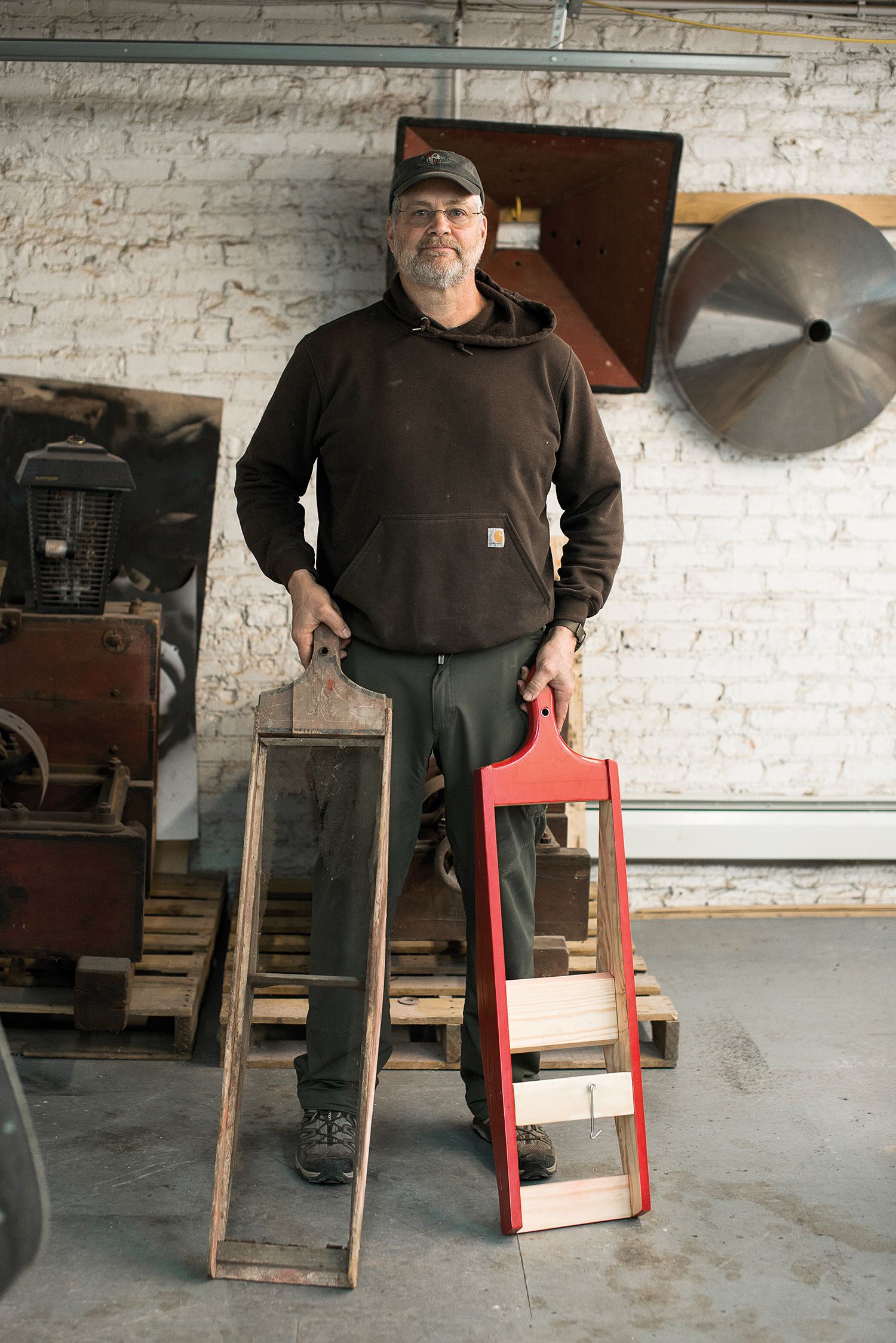ls might seem like a niche endeavor, but an increase in agritourism means more call for Wood and Wheel’s services.
Photo by Karin Strickland

Repairing small-operations gristmills might seem like a niche endeavor, but an increase in agritourism means more call for Wood and Wheel’s services.
Photo by Karin Strickland
Mills date back as far as the third century B.C.E., used to grind corn, wheat, or rye. In the intervening millennia, they definitely improved in function and performance; however, modern machines are rollers that squeeze instead of grind, says Stephen Robertson, who restores gristmills in the 100-year-old range.
Parts can be as rare as the skills it takes to do the job right, but the difference is worth it, he says: “Today’s processing removes the ‘heart’ of the grain, which has a much higher spoilage rate [but] contains most of the natural oils.” That’s where the nutrition and flavor are, he explains.
Stephen defines gristmills as single or multiple pieces of equipment working together to produce a ground grain. The Hendersonville resident specializes in refurbishing portable burr mills, around since 1902, used on family farms and powered by tractors or other small engines. Parts include corn shellers, sifters, and sackers to bag corn.

Potter Dawn Stephenson is the “Wheel” of Wood and Wheel.
Photo by Karin Strickland
“When most people think of gristmills, they picture the large horizontal stones used in the 19th century,” Stephen comments. These gristmills were “single” or “simple” shack style with roofs made of stones, located in remote hollers on Southern Appalachian streams. Their counterparts up North also used water power, but they were much larger facilities set on rivers.
From 1996 to 2017, Stephen and his wife Dawn managed East Fork Farm in Marshall, the site of Stephen’s initial experimentation with mill restoration and corn grinding. In 2014, he began working on an actual mill house which included a waterwheel.
The refurbishing of Stephen’s first burr mill required purchasing three antique mills from Texas. Aiming to learn all he could, “I completely dismantled and restored them,” he says. “During the process, I not only learned how they were made, I got to know other restorers and ‘old timers’ who used this equipment.”
Now, Stephen has purchased mills from numerous parts of the Southeast. “Once my reputation grew as a restorer, I began to get calls from individuals wishing to sell,” he says.
The restoration process is multi-stepped and often comes with a host of complications, among them rotted wood, rusted metal, and worn stones. The wood in every mill Stephen restores can be authentically restored; however, lost castings are irreplaceable and must be newly fabricated out of steel, since original molds no longer exist.
The couple now works out of Wood and Wheel, home of Stephen’s restorations and Dawn’s pottery. Through serendipitous timing, they were able to move their operations into the town’s historical community ice house, within walking distance from their house. “We knew that we needed something to do post farming life,” Stephen says.

Photo by Karin Strickland
Dawn attributes a sleep disorder to her beginning interest in pottery. When she’d wake up in the middle of the night, she would make bread, bake cookies, and start meal prep. “Stephen had a hard time sleeping with the aromas in the kitchen, so he bought me a gift certificate for classes at Odyssey Clayworks in Asheville and set me up with a small studio in the basement,” she says.
“I would say I was a fair-weather farmer and a foul-weather potter,” Dawn continues. “I never had time to throw or hand build pottery during the main farming season, but winter was my creative time.”
Since her first experience at Odyssey, Dawn has since taken classes at Blue Ridge Community College. Among her favorite items to make are birdhouses, tables, and the “old-timey face jugs” that, like the mills, are an important touchstone of the Southern Appalachian vernacular.

Photo by Karin Strickland
Their processes are oftentimes collaborative: Stephen will help with Dawn’s clay molds and with loading the kiln; she’ll assist with Stephen’s woodworking by holding parts for mounting and running calculations. “We bounce ideas off each other all day,” she adds.
Once restored, “the mills are fully functional,” notes Stephen. Still, he’s sold mills to collectors who will never use them, just store or display them. Other customers include farmers who are setting up agritourism displays and “enthusiasts who enjoy going to antique-equipment events.” And then there’s the nostalgia crowd — “retirees who want to grind a little corn annually, like their father or grandfather did.”
Stephen and Dawn Robertson, Wood and Wheel (442 S. Whitted Street, Hendersonville). To make a studio appointment, call 828-206-3276 or e-mail woodandwheel.nc@gmail.com. Visit woodandwheel.com for more information.
